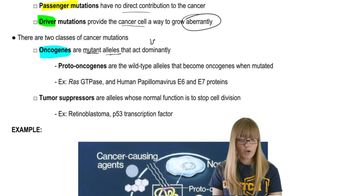- 1. Introduction to Genetics51m
- 2. Mendel's Laws of Inheritance3h 37m
- 3. Extensions to Mendelian Inheritance2h 41m
- 4. Genetic Mapping and Linkage2h 28m
- 5. Genetics of Bacteria and Viruses1h 21m
- 6. Chromosomal Variation1h 48m
- 7. DNA and Chromosome Structure56m
- 8. DNA Replication1h 10m
- 9. Mitosis and Meiosis1h 34m
- 10. Transcription1h 0m
- 11. Translation58m
- 12. Gene Regulation in Prokaryotes1h 19m
- 13. Gene Regulation in Eukaryotes44m
- 14. Genetic Control of Development44m
- 15. Genomes and Genomics1h 50m
- 16. Transposable Elements47m
- 17. Mutation, Repair, and Recombination1h 6m
- 18. Molecular Genetic Tools19m
- 19. Cancer Genetics29m
- 20. Quantitative Genetics1h 26m
- 21. Population Genetics50m
- 22. Evolutionary Genetics29m
19. Cancer Genetics
Cancer Mutations
Problem 25a
Textbook Question
Mutations in tumor-suppressor genes are associated with many types of cancers. In addition, epigenetic changes (such as DNA methylation) of tumor-suppressor genes are also associated with tumorigenesis [Otani et al. (2013). Expert Rev Mol Diagn 13:445–455].
How might hypermethylation of the TP53 gene promoter influence tumorigenesis?
 Verified step by step guidance
Verified step by step guidance1
Understand the role of the TP53 gene: The TP53 gene is a crucial tumor-suppressor gene that encodes the p53 protein, which helps regulate the cell cycle and prevent cancer formation.
Learn about DNA methylation: DNA methylation is an epigenetic mechanism that involves the addition of a methyl group to the DNA, often at cytosine bases in CpG islands, which can affect gene expression.
Explore the concept of hypermethylation: Hypermethylation refers to an increased level of methylation, particularly in the promoter region of a gene, which can lead to gene silencing.
Connect hypermethylation to TP53: If the promoter region of the TP53 gene becomes hypermethylated, it may lead to the silencing of the TP53 gene, reducing or eliminating the production of the p53 protein.
Consider the impact on tumorigenesis: Without functional p53 protein, cells may not effectively undergo cell cycle arrest or apoptosis in response to DNA damage, potentially leading to uncontrolled cell division and tumorigenesis.
Recommended similar problem, with video answer:
 Verified Solution
Verified SolutionThis video solution was recommended by our tutors as helpful for the problem above
Video duration:
2mPlay a video:
Was this helpful?
Key Concepts
Here are the essential concepts you must grasp in order to answer the question correctly.
Tumor-Suppressor Genes
Tumor-suppressor genes are critical components of the cellular machinery that regulate cell growth and division. They function to prevent uncontrolled cell proliferation, and mutations in these genes can lead to cancer. The TP53 gene, often referred to as the 'guardian of the genome,' plays a vital role in maintaining genomic stability and initiating apoptosis in response to DNA damage.
Recommended video:
Guided course

Mapping Genes
DNA Methylation
DNA methylation is an epigenetic modification involving the addition of a methyl group to the DNA molecule, typically at cytosine bases. This process can regulate gene expression without altering the underlying DNA sequence. Hypermethylation of promoter regions, such as that of the TP53 gene, can silence gene expression, leading to the loss of tumor-suppressive functions and contributing to tumorigenesis.
Recommended video:
Guided course

DNA Proofreading
Tumorigenesis
Tumorigenesis is the process by which normal cells transform into cancerous cells, involving a series of genetic and epigenetic changes. This process can be driven by mutations, epigenetic alterations, and environmental factors. The inactivation of tumor-suppressor genes, such as through hypermethylation, is a key event in tumorigenesis, allowing for unchecked cell growth and proliferation.
Recommended video:
Guided course

Cancer Characteristics

 4:50m
4:50mWatch next
Master Cancer Mutations with a bite sized video explanation from Kylia Goodner
Start learningRelated Videos
Related Practice


